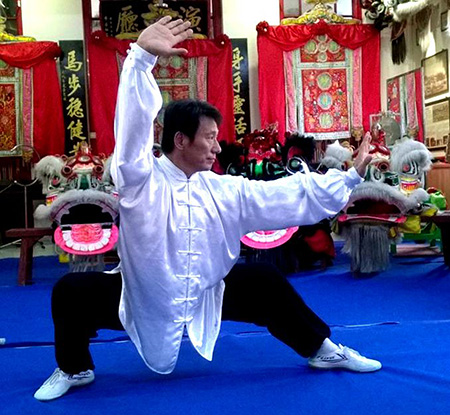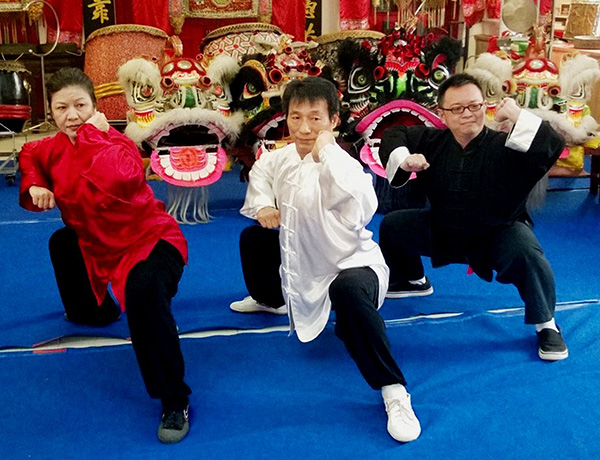
Zhou Yue Wen passing down the forms of northern Chinese martial arts to Lion City. — Pictures by Kenny Ee
ZHOU Yue Wen comes across as a demure hou hou sien sen (gentleman) – good-natured, jovial, witty and knowledgable.
He is not someone you would normally associate with combat techniques and you won’t know he has a tough side until he jolts you with a demonstration of physical hardiness.
Midway through lunch at a Tiong Bahru eatery in Singapore recently, he stood up, got into a horse-stance and gave his pecs a mighty whack with his fists – right, then left.
The force he exerted was tremendous. A loud thud from the fisty blows reveberated across the room. But he did not flinch.
Subsequently – still maintaining his stance – he took a deep breath, then breathed out in a slow and deliberate manner to steady himself.
Rolling down the sleeves of his kungfu attire, he got back to his seat and no sooner had he done this than he was back to his usual self, chatting heartily as he spooned up a piece of coffee-flavoured (yes, coffee-flavoured) duck meat and sipped coffee from a porcelain mug – his favourite drink and he likes it black.
Zhou’s physical formidability comes with years of conditioning – first as a kung fu student, then as a sifu. His exploits on the martial arts stage are belied by his genteel demeanour.
“To attain the highest level in martial arts, you have to constantly test yourself. Everything is possible if you put your heart to it,” the 50-year-old kungfu master told thesundaypost.
Originally from Shanghai, Zhou now lives in Singapore where he conducts martial arts classes for a varied intake of students.
He migrated to the city state in 2003 (10 years after his first visit) for a special reason – to give his second child (a son) a better living environment. At that time, having a second child was a peremptory legislative violation in China.
Zhou has an elder daughter, born in 1989 in Shanghai. The traditional Chinese mentality has always held a son in higher esteem than a daughter.
So after his daughter was born, he treated her as if she was a boy – short hair, boy’s clothing and martial arts, starting at the age of one.
After a while, Zhou realised it was not fair to treat his little girl this way. And this, coupled with the desperation to have a son, made him decide to break the one-child policy by having a second child.
He said he had thought the matter through for some years.
In 2002, his second child was born “secretly” in Shanghai. He got his wish – it was a boy. But it did not take long for the authorities to find out about the violation.
Zhou was a civil servant back then, working at Shanghai’s Children Palace, a type of training school that offers gifted kids after-school education. He lost his job as a result of flouting the one-child-policy.
For Zhou, that was a breaking point. In 2003, he made the decision to emigrate to Singapore.
“I want my family to have a better future,” he said.
Besides, his daughter had fallen in love with the Island Republic during an earlier visit.
First trip
Zhou made his first trip to Singapore back in 1993 as a performing martial artist contracted to Hor Par Villa. He stayed on for four years.
At that time – 10 years prior to settling down in the Island Republic – he already had a feeling he would be returning to stay permanently one day.
Very different from his peers, back in the days when Zhou was at Hor Par Villa, there were already many people asking him to give them martial art lessons during his free time.
He remembers having to wake up two hours earlier every day to give martial arts lessons before the official performance started at Hor Par Villa.
Because of his tight schedule, he often had to continue his martial arts lessons beyond midnight, usually catching only three or four hours sleep a day.
The salary at Hor Par Villa was quite low but Zhou was lucky as he was able to earn five to six thousand Singapore dollars every month to supplement his income through martial arts lessons.
His second visit to Singapore was in 2003 – the year of his emigration – when he began a career as a full-time professional martial arts instructor.
His tutelage was much sought after and by 2011, he had set up his own martial arts school, passing down his teacher Ji Jin Shan’s forms of northern Chinese martial arts to Lion City.
There is a video clip showing an exciting kungfu action between Gong-Er and Ma Shan at a train station in the Chinese movie – The Grand Master.
The clip demonstrated the two forms of well-known northern style martial arts – Ba Gua Zhang and XingYi Quan, two of the many kungfu forms Zhou brought to Singapore from China.
In the formative years, he faced many obstacles trying to introduce northern Chinese martial arts to Singapore.
But he plodded on. The ability to think out of the box, do things outside of the norms and take on all challenges are the core attributes of Zhou’s character that stood him in good stead.

Practice makes perfect.
Cultural Revolution
During the 1960’s and 70’s when the Cultural Revolution exploded in China, martial arts exponents were often the victims of all kinds of punishment.
Zhou was born and grew up in the Zha Bei suburb of Shanghai where most of the well-known martial artists gathered.
Naturally, it was also where most of the conflicts occurred. Street gang fights were common – in fact unavoidable.
So learning martial arts became essential but it had to be done in secret during those violent times when revolutionaries – notably the Red Guards – meted out harsh punishments with impunity to anyone or anything they perceived as subversive or clandestine.
It was under such tulmutlous circumstances that Zhou first started to learn martial arts – for self defence.
Life at the Zha Bei suburb at the time was pretty much survival of the fittest.
“Times were tough, the neighbourhood was rough and you needed to be among the strongest to survive. Learning martial arts gives you the strength to not only defend yourself but also protect your familiy,” he said.
In the 1970’s, Zhou met master Ji Jin Shan (4th generation Ba Gua Zhang grandmaster) and picked up from him many different forms of northern style martial arts, including the Ba Gua Zhang, Yue Jia Quan and Mi Zhong Quan.
Ji Jin Shan was the top four martial artists in Shanghai, and also the chief bodyguard of famous Shanghai tycoon Huang Jing Rong in the 1930’s.
After Ji Jin Shan passed away, Zhou became a student of master Li Zun Si, learning the northern Chinese-Muslim martial arts form called Xin Yi Liu He Quan.
In the 1980’s, apart from being the official student of masters Ji Jin Shan and Li Zun Si, Zhou also visited other famous masters to learn other martial arts styles.
Because of his expertise in the Yue Jia Quan, he was selected by the Shanghai Opera House to portary the famous Song Dynasty General Yue Fei on stage.
Thereafter, he was invited by the Singapore Hor Par Villa to be a performing martial artist. That was how he first set foot in Singapore in 1993.
While in Singapore, Zhou was often invited to perform at events, organised by the town council of Tanjong Pagar (former Prime Minster Lee Kwan Yew’s constituency).
He recalled Lee always enjoyed watching his performance with the big long sword.
Returning to Shanghai
After completing the contract with Hor Par Villa in 1996, Zhou returned to Shanghai to be a martial arts instructor and later, the chief instructor of the Shanghai Min Qiang Martial Arts School.
He was also invited to teach martial arts at the Children Palace in Shanghai.
Gradually, after scaling the pinnacle of his craft to attain master status, he became a martial arts icon in Shanghai.
Life was good for Zhou at that time but he was ‘very uncomfortable’ being a Chinese without a son. That was when he decided to have a second child in violation of the one-child policy.
When Zhou’s son was born in 2003, his daughter’s life returned to normal – she no longer had to disguise as a boy.
Later that year, he fulfilled his long-cherished dream of bringing his family to settle down in Singapore.
The decision was partly due to his daughter’s love for Singapore and Zhou’s own avowed wish to compensate her for the past ‘unfair treatment.’
Chin Woo instructor
After emigrating to Singapore in 2003, Zhou was first employed by the Singapore Chin Woo Athletic Association as a martial arts instructor.
Then with the help of former students and friends in Singapore, he opened his own martial arts school in 2011, and started passing down grand master Ji Jin Shan’s flagship northern style martial arts to the city state.
Zhou who also founded Min Qiang martial arts school in Singapore, specialised in many northern Chinese martial art styles, including Ba Gua Zhang, Xing Yi Quan, Mi Zhong Quan, BaJi Quan and Xin Yi Liu He Quan.
Before he came to Singapore, there were hardly any such martial arts styles there.
Zhou was credited with bringing the martial arts style of Mi Zhong Quan to Singapore as well.
This particular style was the brainchild of the famous Chinese martial artist Huo Yuan Jia. Chin Woo Athletic Association adopted it as its benchmark martial arts style.
Zhou’s endeavour to promote the northern Chinese martial arts in Singapore continues today. He now has over 50 regular students, including university professors, investment bankers, businessmen, corporate professionals and retirees.
His 13-year-old son, Zhou Tian, has been learning from him since young, and often participates in martial arts events in Singapore – and his twin brother who lives in Kuala Lumpur, also practises martial arts, and runs a traditional Chinese medicine clinic in the Malaysian national capital.
Zhou has been invited to hold martial arts demonstrations and teach northern Chinese martial arts sytles in Thailand and other Asean countries.
Sarawak is one of the places in the region he has yet to visit.
“Maybe one day, I will come to Kuching for a holiday,” he said in his usual affable manner.
